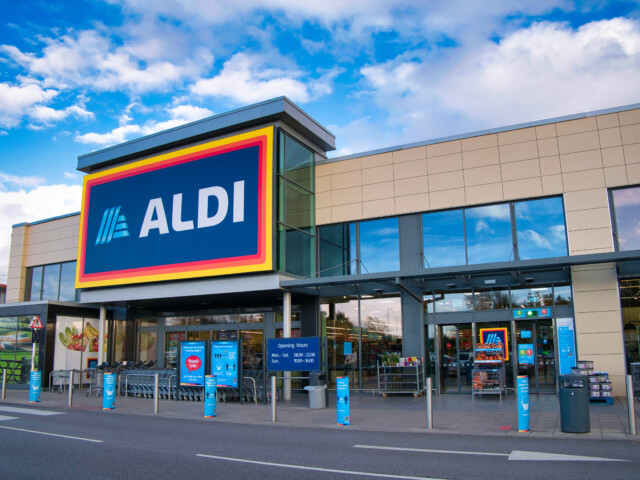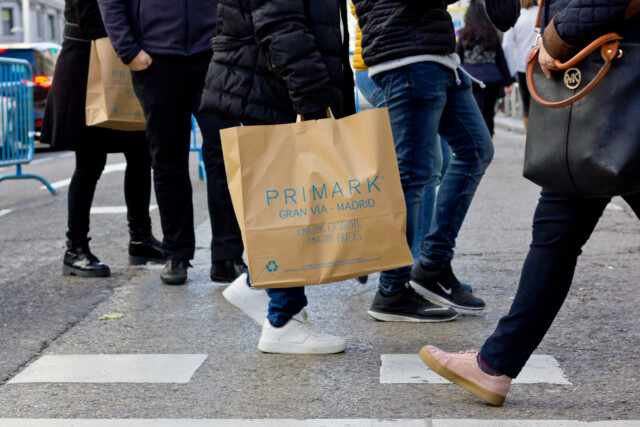
ONE pound in every ten of grocery shopping is now spent at Aldi, as the discount supermarket wins over those trying to cut their soaring food bills.
The chain, which sells its own versions of well-known brands and fresh food, hit a record-high market share of ten per cent in March, industry analysts Kantar found.
Aldi hit a record-high market share of ten per cent in March
Aldi CEO Giles Hurley said: ‘Shoppers are voting with their feet by switching from more expensive supermarkets to Aldi’
Aldi has been a growing threat to the traditional supermarkets and overtook Morrisons to become the UK’s fourth-largest grocer last year.
Tesco and Sainsbury’s have both recently felt the need to launch “Aldi Price Match” promotions.
Aldi CEO Giles Hurley said: “Shoppers are voting with their feet by switching from more expensive supermarkets to Aldi. As we hit this new market-share milestone, our commitment to offering the lowest grocery prices in Britain is stronger than ever.”
The German discount chain has quadrupled its market share over the past 14 years and doubled its store numbers to 990 shops.
It aims to expand to more than 1,000 stores and is creating 6,000 jobs this year at a time when rivals cut jobs.
Shoppers are being more savvy in the face of 45-year-high inflation.
Food bills are 17.3 per cent higher than they were a year ago but the rate of price increases is down slightly from 17.5 per cent in March, Kantar data showed.
Fraser McKevitt at Kantar said it was “too early to call” whether food inflation would continue to fall, adding: “It’s important to remember, of course, that falling grocery inflation doesn’t mean lower prices, it just means they aren’t increasing as quickly.”
Sing when you’re skimming
BIG food firms yesterday admitted they have been heaping pressure on hard-pressed shoppers by hiking prices to protect profit margins.
Kit-Kat maker Nestle revealed it had increased its profit margins to 17 per cent by raising prices 9 per cent over the past three months — higher than its 15 per cent margin pre-pandemic.
 Nestle have put up the price of Felix cat food, advertised by Robbie Williams, by 12.2%
Nestle have put up the price of Felix cat food, advertised by Robbie Williams, by 12.2%
The Swiss food giant, which also makes Felix cat food, recent ads for which have featured Robbie Williams, said its pet food prices jumped 12.2 per cent.
Pepsico said its sale growth of 14 per cent also came from price hikes, having sold 3 per cent fewer drinks.
McDonald’s said menu price rises in February — such as its Mayo Chicken going from 90p to £1.19 — fuelled a 12.6 per cent sales increase.
Natwest chief to depart
NATWEST chairman Sir Howard Davies yesterday announced he would step down next year, adding the search for his replacement will begin soon.
The bank’s shares are down by a fifth since he become chairman in 2015.
He said: “One would have hoped the share price would have been stronger, but that’s the way banks are valued at the moment.”
Sir Howard added NatWest had a “robust and resilient balance sheet” as he distanced it from the recent turmoil at Silicon Valley Bank and Credit Suisse, which sparked financial sector jitters.
He said: “Ultimately, poor risk management and long-standing, idiosyncratic challenges were largely to blame for those failures.”
Primark goes for growth
PRIMARK is forging ahead with expansion plans.
The retail giant is rolling out its click-and-collect online ordering service to 32 London stores this summer as it dips its toes into the digital age.
 Primark is rolling out its click-and-collect online ordering service to 32 London stores this summer
Primark is rolling out its click-and-collect online ordering service to 32 London stores this summer
And it is opening its first store in Texas, becoming one of Britain’s best fashion exports.
CEO George Weston said: “In cash-constrained times, we do well because we sell to a wide demographic.”
He added that the retailer had been helped by Government energy support, which put more cash in shoppers’ pockets.
Primark has also been boosted by selling more expensive premium ranges to lure middle-class shoppers on a budget.
These include £20 dresses and £40 trench coats.
Mr Weston said Primark would hold off raising prices again this year, as the costs of cotton, polyester and shipping are expected to come down.







